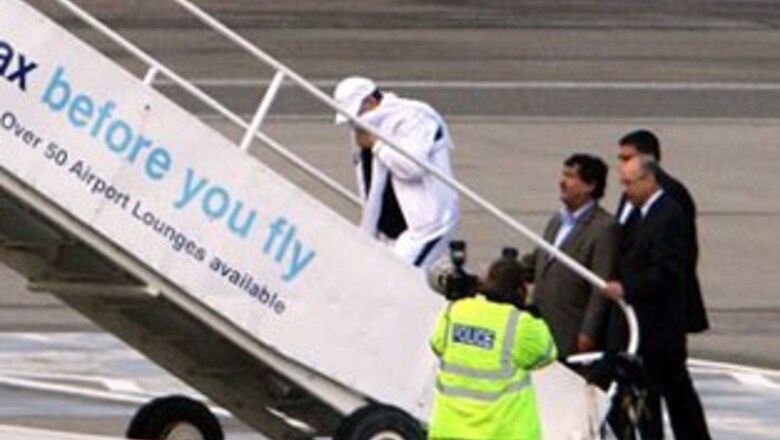
views
Edinburgh: A former Libyan agent jailed for life for the 1988 Lockerbie bombing that killed 270 people flew home on Thursday after Scottish authorities released him because he is dying of cancer.
Abdel Basset al-Megrahi, believed to have less than three months to live, was freed on compassionate grounds, a decision strongly criticised by the United States, which had campaigned to keep him in prison. Many of the victims were Americans.
"He is a dying man, he is terminally ill," Scottish justice minister Kenny MacAskill told a news conference. "My decision is that he returns home to die."
Wearing a white track-suit and baseball cap and with a white scarf clutched to his face, Megrahi walked up the steps to a waiting Libyan aircraft with the aid of a stick. The plane then left Glasgow Airport to fly him home to Tripoli.
The United States government, which opposed Megrahi's early release, said it "deeply regrets" the decision.
"As we have expressed repeatedly to officials of the government of the United Kingdom and to Scottish authorities, we continue to believe that Megrahi should serve out his sentence in Scotland," the White House said in a statement.
Megrahi, 57, is the only person convicted for the bombing of Pan Am Flight 103, which blew up in mid-air above the Scottish town of Lockerbie on December 21, 1988.
He lost an appeal against his conviction in 2002, but a Scottish review of his case ruled in 2007 that there might have been a miscarriage of justice.
 This December 1988 file photo shows wrecked houses and a deep gash in the ground in the village of Lockerbie, Scotland (damage caused by the crash of Pan Am Flight 103 on December 21, 1988).
This December 1988 file photo shows wrecked houses and a deep gash in the ground in the village of Lockerbie, Scotland (damage caused by the crash of Pan Am Flight 103 on December 21, 1988).
'No hero's welcome'
Relatives of many of the 189 American victims thought Megrahi should have served his full life sentence in prison after being convicted of Britain's deadliest terrorist attack.
PAGE_BREAK
Frank Duggan, president of the Victims of Pan Am 103, a group that represents the families of US victims, said he understood the Libyan government had promised that Megrahi would not "go back to a hero's welcome".
"There is going to be no dancing in the end-zone, as the expression goes," he told Reuters.
Hundreds of young Libyans gathered at Tripoli's Mitiga Airport where Megrahi's plane was expected to land. Many waved the country's green flag and held banners with messages of support and praise for Libya's government and for Megrahi.
Many of the banners carried the name of Libya's National Youth Association, a staunch supporter of Libyan leader Muammar Gaddafi. One read: "You promised and you fulfilled the promise and you returned Abdel Basset al-Megrahi to his family".
"Libyan youth are welcoming the return today of political prisoner Abdul Basset al-Megrahi," said one young man who identified himself as Sami.
The families of many of the Britons killed in the bombing were never convinced by the strength of the evidence against him and thought he should be allowed to go home to die.
"I am delighted. I don't think he had anything to do with it and I think he was effectively framed," Jim Swire, whose daughter Flora died in the bombing, told Reuters.
Megrahi is likely to be warmly welcomed by Gaddafi, who has moved closer to the Western mainstream since dropping his nuclear weapons programme in 2003.
"I think the news is being warmly received in Tripoli by everyone and it shows that the confidence Libya had in the Scottish judicial system was well placed," said Youssef Sawani, director of the Gaddafi International Charity and Development Foundation.
The Megrahi case became a millstone for the Scottish government as it balanced a series of competing interests, among them the fact that British oil companies are trying to do more business in Libya and hope Megrahi's release may open doors.
The government, led by the separatist Scottish National Party, has devolved powers from the rest of Britain on justice and other policies.
The British oil company BP ended a 30-year absence from Libya in 2007 when it signed its biggest exploration commitment through a bilateral deal. Royal Dutch Shell also wants to tap Libya's reserves, the biggest in Africa.
Former British ambassador to Libya Oliver Miles played down the benefits to Britain and said the release was only one part of a long process of improving relations.
"It removes an irritant, but it wasn't a great irritant," he told Reuters. "I don't think it is going to give us lots of lovely new business."














Comments
0 comment